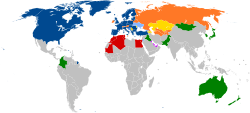Background
Yugoslavia's communist government sided with the Eastern Bloc at the beginning of the Cold War, but pursued a policy of neutrality following the Tito–Stalin split in 1948. [1] It was a founding member of the Non-Aligned Movement in 1961. Since that country's dissolution most of its successor states have joined NATO, but the largest of them, Serbia, has maintained Yugoslavia's policy of neutrality.
2011–2022: Individual Partnership Action Plan
In April 2011 Serbia's request for an Individual Partnership Action Plan was approved by NATO, [11] and Serbia submitted a draft IPAP in May 2013. [12] The agreement was finalized on 15 January 2015. [13] [14] It regularly participates in its military maneuvers, and hosted a joint civil protection exercise with NATO in 2018. [15] [16]
2022–present: Russian invasion of Ukraine
Following the start of the Russian invasion of Ukraine, several neutral states reconsidered their alignment, including Finland and Sweden which applied for NATO membership. However, Serbian President Aleksandar Vučić, reiterated in that his government was not interested in NATO membership. [17] The minor Serbian Renewal Movement, which has two seats in the National Assembly, and the Liberal Democratic Party, which currently has none, remain the most vocal political parties in favor of NATO membership. [18] The Democratic Party abandoned its pro-NATO attitude, claiming the Partnership for Peace is enough.
Serbia maintains close relations with Russia, due to their shared Slavic and Eastern Orthodox culture but also due to its support on the Kosovo issue. Serbia and Belarus are the only European states which refused to impose sanctions on Russia in response to its invasion of Ukraine. [19] [20] [21]
This page is based on this
Wikipedia article Text is available under the
CC BY-SA 4.0 license; additional terms may apply.
Images, videos and audio are available under their respective licenses.






